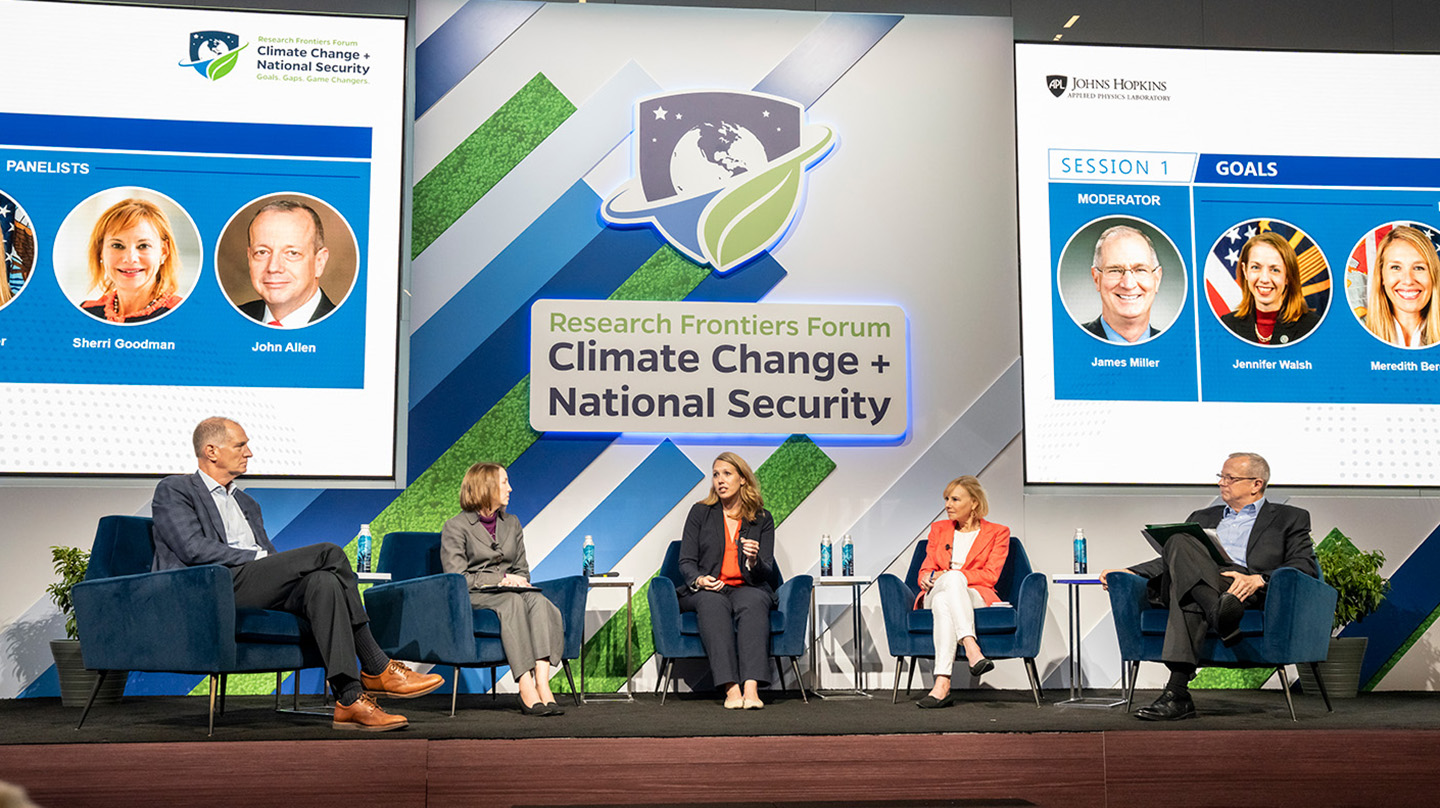News
Five Key Takeaways From the 2023 Research Frontiers Forum: Climate Change + National Security
On June 8, the Johns Hopkins Applied Physics Laboratory (APL) hosted the 2023 Research Frontiers Forum at its campus in Laurel, Maryland, assembling diverse thought leaders to discuss climate change and national security.
The conversation strengthened the Laboratory's alignment and commitment to achieving national goals, provided firsthand accounts of critical gaps we face, and offered a view of promising technologies that can provide the necessary climate intelligence, operational resilience and green systems to enable a climate-ready force.
Panel videos are available to watch on YouTube.
Additional takeaways from the event are as follows:
- The Earth’s changing climate presents challenges to military members, equipment and facilities — and impacts mission readiness. Having recognized the climate crisis in the 2022 Defense Strategy, the Department of Defense (DoD) is prioritizing solutions, partnerships and technology that will help the armed forces respond to, mitigate and adapt to climate-related threats. Integrated support at the local, state and federal levels of government; improved forecasting capabilities; and implementation of a centralized and coordinated response group, such as a “Climate Command,” can lead to tangible solutions to climate challenges.
- Capability gaps exist, and they need to be addressed to effectively mitigate and adapt to a climate-changed world. Technological advances will be critical to closing these gaps. Capability gaps include climate-related situational awareness, contested logistics and energy-efficient military bases. It’s often thought that climate-friendly solutions to address these gaps are expensive or inefficient, but that’s not the case. Solutions that enable efficient, resilient and domesticated systems are beneficial to both the climate and operational effectiveness.
- Climate intelligence integrates and analyzes climate data so that it is easily interpretable and actionable, and it is key to making informed decisions and policy across all industries. Improved tools and technology that use artificial intelligence, high-resolution satellite data and modeling, high-powered computing, and strategic partnerships between science and security experts can deliver quick and actionable climate analysis.
- As the environment changes, the types of missions the military responds to, and the locations it operates in, are changing too. Thawing permafrost and melting sea ice mean the natural barriers separating superpowers in the Arctic are retreating. To ensure the DoD is prepared to operate in these situations and further climate stressors, the development of eco-friendly technologies such as anti-ice coatings, multifunctional materials, and efficient energy and resilient agriculture systems is paramount.
- One of the best ways to mitigate the effects of climate change is to slow down the warming of the planet. The federal government is looking at a variety of ways to limit the production of greenhouse gases that contribute to that warming. These include methods of direct carbon capture, removal and conversion, as well as a continued transition to electric power across sectors. But the switch to new power sources and materials could present its own national security challenges, such as vulnerabilities from severe weather, new potential cyber threats and increased reliance on rare-earths supply chains. To address these challenges, the DoD and Department of Energy are incentivizing innovations that will accelerate and improve adoption of clean-energy technologies.
This is a critical decade for humanity to avert some of the most devastating projected impacts from climate change. The engaging conversations and demonstrations that were held at the Research Frontiers Forum between government, academia and industry leaders were great opportunities to advance and accelerate solutions to climate and national security challenges, but it will take continued commitment and innovation to deliver tangible solutions.
